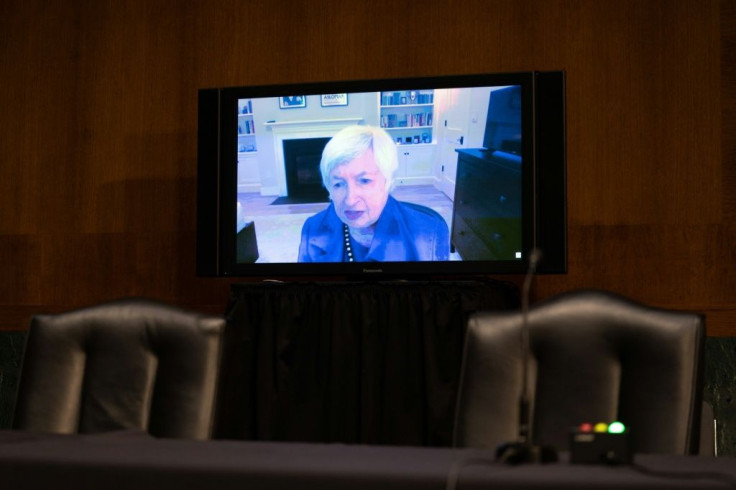Tug-of-war Between Debt And Stimulus Awaits Yellen At Treasury
Spend big to help the economy while dealing with a massive national debt: as US Treasury secretary, Janet Yellen will face a delicate dance between undoing the damage done by the coronavirus while figuring out ways to pay the bill.
With employment faltering and virus infections soaring, President-elect Joe Biden, who takes office on Wednesday, has proposed a $1.9 trillion rescue package to revitalize the economy and kickstart the underperforming vaccination programs that will be critical to bringing the pandemic to an end.
If confirmed by the Senate, Yellen, who would be the first woman to serve as Treasury secretary, would be tasked with getting the massive bill through Congress.
That will entail convincing skeptical lawmakers that the benefit of more spending outweighs concerns about the country's soaring debt level.
"Neither the President-elect, nor I, propose this relief package without an appreciation for the country's debt burden. But right now, with interest rates at historic lows, the smartest thing we can do is act big," Yellen told the Senate Finance Committee at her confirmation hearing on Tuesday.
Yellen, who also was the first woman to lead the Federal Reserve, would take office as the world's largest economy struggles to get back on its feet after Covid-19 caused tens of millions of layoffs and a sharp contraction in economic growth.
She also would be one of the few Treasury secretaries with a background in economics and policy, rather than a career at a Wall Street investment bank.
Two previous pandemic relief bills passed by Congress have helped keep the country from a worse downturn by giving loans and grants to small businesses and expanding unemployment benefits, among other provisions.
But that spending also caused an explosion of the deficit for the 2020 fiscal year, which jumped more than 200 percent to an all-time high of $3.1 trillion, more than twice the prior record.
The spending continued in the first quarter of the 2021 fiscal year, breaking a quarterly record.
While some sectors have seen a steady rebound, there is evidence that the tentative recovery is flagging, with weekly Labor Department data showing the pace of layoffs increasing and the economy losing jobs in December.

But Oxford Economics said a "fiscal paradigm shift" is underway in how economists think about debt.
"The growing consensus amongst academics and policy analysts is that what matters more than the levels of budget deficits and debt, is the currently low real cost of the debt -- the difference between the boost to growth and the debt servicing cost," the firm said in an analysis.
The Fed's commitment to keep the benchmark lending interest rate at zero for an extended period to promote full employment, is helping Yellen's case to focus on spending to boost the recovery rather than worry about debt for now.
"It's something we will eventually need to attend to, but it's also important for America to invest," she said, adding the administration could consider issuing long-term debt to fund their plans.
Those investments will help prevent long-term scarring of the economy, she said.
Prior to her nomination, Yellen gave indications that she would keep a close eye on Wall Street, though she also has taken money from some of its biggest firms after she left her role in government.
She spoke out against moves pursued by outgoing President Donald Trump's administration to loosen regulations on banks, but acknowledged at her hearing that they seemed to have weathered the shocks caused by the pandemic thus far.
Her image was however complicated by revelations that she earned more than $7 million in speaking fees since leaving her position as Fed chair in early 2018, including from financial giants Goldman Sachs and Citigroup -- a common if sometimes criticized practice.
Nonetheless, Yellen's nomination was met hopefully by groups like Americans for Financial Reform, which advocates for tighter controls on the nation's largest banks.
At her hearing, Yellen was not asked about regulation, but agreed that her focus would not be on providing aid to the financial industry.
"Our focus should be on Main Street not Wall Street," she said.
© Copyright AFP 2024. All rights reserved.





















